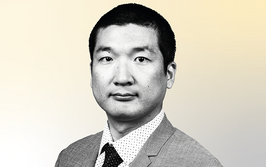Modern Day Telemachus
As the pathology profession evolves and transitioning to work becomes more challenging, the importance of mentoring becomes greater than ever.
The transition from residency to practice can be a challenging one – job demographics are changing, and the role of the pathologist within hospitals and labs is evolving. It is therefore no surprise that many residents have concerns over how to make the leap, with many citing fears such as negotiating interviews, adjusting to work, and what to do if their dream job isn’t everything they hoped for (See “Top Ten Pathology Resident Concerns”).
The transition from residency to practice can be a challenging one – job demographics are changing, and the role of the pathologist within hospitals and labs is evolving. It is therefore no surprise that many residents have concerns over how to make the leap, with many citing fears such as negotiating interviews, adjusting to work, and what to do if their dream job isn’t everything they hoped for (See “Top Ten Pathology Resident Concerns”).
The transition from residency to practice can be a challenging one – job demographics are changing, and the role of the pathologist within hospitals and labs is evolving. It is therefore no surprise that many residents have concerns over how to make the leap, with many citing fears such as negotiating interviews, adjusting to work, and what to do if their dream job isn’t everything they hoped for (See “Top Ten Pathology Resident Concerns”).

At a Glance
- Graduating from residency to practice can be tough, and changing roles and job markets means many residents are unsure how to successfully tackle the role of junior pathologist
- Among the top concerns are work-life balance, navigating interviews and how to cope if things go wrong
- One potential solution is a mentorship program, which allows a senior pathologist to share their skills and experience with the next generation
- Understanding resident worries, and establishing effective mentoring programs with clear ground rules, are key to supporting residents’ transition to the workplace
The transition from residency to practice can be a challenging one – job demographics are changing, and the role of the pathologist within hospitals and labs is evolving. It is therefore no surprise that many residents have concerns over how to make the leap, with many citing fears such as negotiating interviews, adjusting to work, and what to do if their dream job isn’t everything they hoped for (See “Top Ten Pathology Resident Concerns”).
The fields of management and business have long appreciated and harnessed the power of the mentor. In Greek mythology, Mentor was charged with caring for Odysseus’s son, Telemachus. Gifted with wisdom and experience, he was able to guide his younger charge. Contemporary mentorships include any relationship which allows an experienced individual to pass on his or her insight to those who can gain from it, and can be found in many facets of life, both personal and professional.
Despite the long history of mentorship, modern medicine has been slow to embrace and promote the idea. But, things are changing and Institutes are starting to place a greater emphasis on it. For example, the department of Pathology at McGill University, Quebec, Canada, is spearheading efforts to promote mentorship, and is creating a database which will link staff and residents who want to take part. The hope is that mentorship will soon become ingrained into the culture of the pathology department (see “Mentoring: What You Need to Know" below).
Making mentoring work
Why is this approach important? It’s clear that transitioning to practice is difficult for residents; a mentor can provide invaluable support, knowledge and a wealth of experience, helping to prepare residents for the next stage of their career.
In acknowledgement of the challenges faced by residents, the Canadian Association of Pathologists (CAP) hosted an inaugural workshop dinner for residents at its annual congress, where three pathologists shared their personal experiences of transitioning from residency to practice, and stressed the importance of creating strong bonds between staff and trainees. The workshop was created by Bojana Djordjevic and her colleagues from the Universities of Ottawa and Toronto, Canada. I spoke with Bojana about her role in creating the workshop, and how programs like this can help to prepare residents for the end of their training.
The transition from residency to practice can be a challenging one – job demographics are changing, and the role of the pathologist within hospitals and labs is evolving. It is therefore no surprise that many residents have concerns over how to make the leap, with many citing fears such as negotiating interviews, adjusting to work, and what to do if their dream job isn’t everything they hoped for (See “Top Ten Pathology Resident Concerns”).
You say it’s important to provide support at a residents’ transition to work. Why?
Through my own work as a mentor, residents have opened up to me about a multitude of issues: fellowships, job interviews, childcare, essentially everything. I realized there was an underlying theme: the transition to practice. It’s important to provide all residents with the opportunity to seek guidance from junior staff who have both experience, and fresh memories of what it was like to finish their own training. It’s also very valuable for residents to learn from the experiences of pathologists from other career paths, so they could see how many ways there are to get from A to B in pathology. The workshop that I ran at this year’s CAP congress was developed precisely with these objectives in mind.
Why are workshops needed?
Teaching residents about these skills in a formal residency curriculum is hard, yet these decisions are pivotal. We aim to cover concerns in an integrated manner, as they are all interconnected – the fellowship you pursue will influence the job you get, which affects your professional role, and this in turn impacts your personal life. It’s a domino effect.
What do you think is the biggest obstacle facing newly graduating pathology residents?
I would say finding your first job is the most universal and significant issue. Everyone wants to find a job that suits their career and personal interests. In Canada specifically, changes to the economy and government funding mean pathologists work long into their sixties, and even seventies, and this is changing the job market. I feel tackling these issues is more important now than ever.
Ancient, but not out-of-date
Although embarking on a new stage in any career will always be a daunting prospect, it is crucial to give residents the support they need during this transition. One important but underused way to provide this is through the use of mentorship programs.
What was the biggest hurdle you faced when entering practice?
Finding my path. In training, your path is laid out in front of you. Your years are very structured, but when you get to practice there are really no objectives anymore. You’ve just spent eight to 10 years in training and now you wonder, “what am I supposed to do?”
The biggest epiphany I had was when I realized that I am now the navigator of my own career path. This is a bit scary initially, but eventually it becomes very liberating. Now, I feel good about breaking my own ground. Career building is a constantly evolving process. You need to reflect on the career you want, what you want to accomplish, and what you’re willing to sacrifice.
How can pathology departments improve their residents’ transition?
Speaking of my experience in Canada, residency programs need to expose residents to the “real world” caseload of a staff member. But it is a tremendous challenge for programs to strike a balance between exposure to case volume and providing residents with sufficient time to assimilate, study and prepare for their exams. Internationally, I think one solution is graduated responsibility, which can ease residents into the roles and core competencies of a member of staff.
What advice would you offer pathologists in training?
Be ravenous. Take every opportunity to prepare yourself for the next step. If you’re a junior resident, aspire to be like a senior resident. If you’re a senior resident, try to think like a junior staff member. Treat every case like it’s your own and set yourself high standards – your residency sets the tone for the rest of your career.
On the other hand, get into as much trouble as you can! This is a safe time for you to learn in a supervised environment, without worrying about the cost of mistakes. Don’t be afraid to look at cases, ask the questions you want to, and above all, to be wrong.
Top Ten Pathology Resident Concerns
A recent survey of Canadian pathology residents (1) aimed to identify what they viewed as the most important issues concerning their transition into the role of pathologist – of 32 possible topics, the 10 most prioritized included:
- Choosing a practice pattern that is suitable
- Interviewing and negotiating when getting a first job
- Choosing to practice in the right location
- The first day of work, and adjusting to a staff workload
- Getting involved in medical student, resident and fellow education
- Work-life balance
- Obtaining fellowship training
- Having a back-up plan
- What to do if things don’t seem to be working out at a new job
- Dealing with administrative roles both within and beyond the pathology department
What advice would you offer staff who are interested in helping their trainees?
Get involved, and connect. Everyone has their own story; residents tell me about where they’re from, their training background, their family life. By showing others that you don’t only care about their medical knowledge, but also their personal journey, you offer them an opportunity to open up to you, and show you how to support them. Whether it’s providing childcare resources, or linking them up with the right researcher, you can then help them in the best way, based on their personal needs.
Chelsea Maedler is chief resident of Anatomic Pathology at McGill University, Montreal, Canada.
Bojana Djordjevic is an assistant professor at the University of Ottawa and a gynecologic pathologist at The Ottawa Hospital, Ontario, Canada.
Mentoring: What You Need To Know
In a departmental workshop in November 2014, the residents and staff at McGill University shared the nine things about mentorship every pathologist should know, based on their own personal experiences.
1. It’s Symbiotic
Many pathologists view mentoring as a one-way street, with little reward for the senior pathologist. But when done properly, this perception falls by the wayside. A new way to help others, recognition (including accelerated promotion), and career satisfaction are just a few of the benefits. Being a mentor can give you a sense of pride, and a hand in developing the next generation, allowing you to pass on the expertise and skills you’ve developed during your career.
2. There Is No Magic Formula, But Ground Rules Help
There is no one way to promote, organize or develop a mentorship program that guarantees a great experience for every trainee. But good ground rules, and understanding the core concepts of mentorship, will help everyone involved. Educating staff and trainees on good practices ensures common mistakes are avoided. Workshops, teaching sessions and retreats are all good ways to establish the “right” mentorship culture. Universities and faculties often have support staff or educators who will be able to help you create effective and engaging discussions.
3. Mentorship Is Not Friendship
This doesn’t mean a mentoring relationship should be cold and overly formal. On the contrary, it should be cordial, personal and enjoyable. But remember that the nature of this relationship means the power balance can never be equal – this imbalance is what distinguishes a mentor from a friend, and maintaining an appropriate professional distance is advisable.
4. Follow The 3 “C”S
Competence, confidence and commitment: every successful mentoring relationship is founded on these three attributes, and it has to come from both sides. Competence means sharing your knowledge and experience, maintaining mutual respect and using good judgment. Confidence comes from a mentor’s willingness to share their contacts and resources, and also from their willingness to allow their protégé to develop on their own terms. On the flip side, mentees need to show initiative and interest, and share credit for their successes. Commitment is an obvious but commonly overlooked quality. Mentor and mentee need to invest time, energy and effort, and be open to sharing personal experiences, especially negative ones.
5. Faculties Love Mentorship,
And So Should You!
Although much of the evidence is still anecdotal, promoting mentorship is thought to contribute to healthier work environments, and possibly improved patient care. It has also been reported as improving professional relations between senior and junior faculty members, as well boosting productivity by encouraging collaboration. It provides an opportunity to air potential problems and find solutions, helping to keep residents satisfied and supported.
6. Hitting The Wall
There are many perceived barriers that need to be overcome before an institution can create a successful program. Many people think they simply don’t have time, on top of clinical, research and administrative responsibilities, and a lack of resources and training can also be huge barriers. Failure to recognize the importance and value of mentoring, along with inconsistent implementation, participation, and evaluation, are all issues that can stifle progress if they aren’t addressed.
7. Know When You Need To Break Up
Just like your personal and romantic relationships, sometimes you’ll find you simply aren’t a good fit. Compatibility plays a huge role in the success of a mentorship, and the individuals involved should not be afraid to openly discuss this. If either party feels things simply aren’t working, they should be able to comfortably end the relationship in a safe and professional manner. When developing a mentoring program, educating faculty about this concept is crucial, as it makes sure individuals are empowered to address the issue if they need to, and could help to prevent burn out.
8. Mentorship At Every Level
Mentoring relationships are not restricted to resident trainees and staff. Junior staff members have found mentorship with senior staff invaluable to their progress and careers. Pathology assistants, technicians and medical students can all benefit from liaising with more senior staff. Encouraging, promoting and rewarding pathology residents for undertaking mentorship roles with more junior members of the department can help ensure that they continue this tradition throughout
their careers.
9. The Myth Of The Perfect Mentor
Don't let being a “perfect mentor” get in the way of being a good one – there is no such thing. Attempting to solve a mentees’ every problem or offering advice on situations outside of your expertise can potentially erode trust and cause problems. Stay within your comfort zone, and understand you own limitations. If you’re unsure of how to help or support your mentee, be honest.
- B Djordjevic et al., “Transition into the practice of anatomical pathology: a workshop for residents”, presented at the Canadian Laboratory Medicine Congress, June 20, 2015; Montreal, Canada.
Chelsea Maedler is chief resident of Anatomic Pathology at McGill University, Montreal, Canada.
Bojana Djordjevic is an assistant professor at the University of Ottawa and a gynecologic pathologist at The Ottawa Hospital, Ontario, Canada.




















